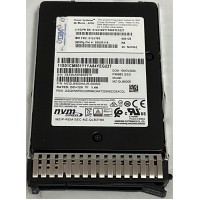IBM 59B7 02YC614 02YC615 EC7T EC5X 800GB SSD NVMe U.2 Mainstream Module
IBM 59B7 800GB SSD NVMe U.2 Mainstream adapter is a high performance SSD formatted in 4096 byte sectors for IBM Power10 and Power9 Servers running AIX, Linux Server or VIOS workloads, has 02YC614 02YC615 part numbers, and may have EC7T or EC5X feature codes. The IBM 59B7 800GB SSD NVMe U.2 Mainstream adapter is a fourth generation PCIe solid state drive with EC5X can be installed in any U.2 7mm NVMe PCIe Gen4 x 4 interface of the IBM Power Server, and EC7T can be installed in any U.2 15mm NVMe PCIe Gen4 x 4 interface. NVMe is a high performance architecture and command protocol that can read/write flash memory. Compared to a SAS or SATA SSD, the NVMe SSD provides more read/write IOPS and larger GB per second throughput.
IBM 59B7 800 GB solid-state drive is rated at 2.4 DWPD (Drive Writes Per Day) calculated over a 5-year period for 100% random write workloads that are 4K bytes or larger. Use for workloads within this rating are fully supported and will maintain high reliability and MTBF. As with any SSD, the nature of the IBM Power Server workload will greatly impact the maximum write capacity. If a high percentage of more sequentially oriented writes is used instead of random writes, the maximum write capacity will be larger. Writes past the SSD's maximum write capacity will continue to work for some period of time, but perform much more slowly.
Whether the IBM Power Server’s application uses sequential or random reads from the device does not affect the life of the device. A Predictive Failure Analysis message will indicate that it is time to replace the SSD if enabled by the operating system and system administrator. Customers are recommended to monitor SMART log critical information via the appropriate OS utility to observe drive life remaining information. IBM NVMe SSD failures will be replaced during the standard warranty and maintenance period for SSD's that have not reached the maximum number of write cycles. SSD's that reach this limit may fail to operate according to specifications and must be replaced at the client's expense. Boot supported. Data redundancy on a failed SSD may be provided by OS mirroring or software RAID wherever applicable.




